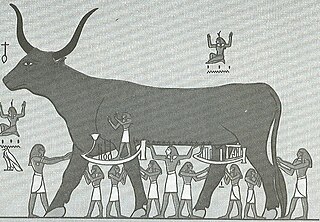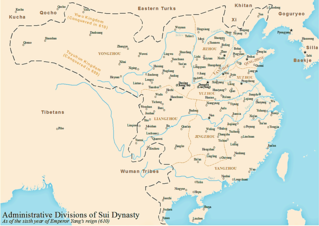
The Taiping Rebellion, also known as the Taiping Civil War or the Taiping Revolution, was a civil war in China between the Manchu-led Qing dynasty and the Hakka-led Taiping Heavenly Kingdom. It lasted from 1850 until the fall of Tianjing in 1864, although the last rebel army was not wiped out until August 1871. The conflict resulted in approximately 20 to 30 million deaths. The established Qing government won decisively, although at great cost to its fiscal and political structure.

Hong Xiuquan, born Hong Huoxiu and with the courtesy name Renkun, was a Chinese revolutionary and religious leader who led the Taiping Rebellion against the Qing dynasty. He established the Taiping Heavenly Kingdom over large portions of southern China, with himself as its "Heavenly King".

Alan Lee is an English book illustrator and film conceptual designer. He is best known for his artwork inspired by J. R. R. Tolkien's fantasy novels, and for his work on the conceptual design of Peter Jackson's film adaptations of Tolkien, The Lord of the Rings and The Hobbit film series.
Jonathan Dermot Spence was an English-born American historian, sinologist, and writer who specialized in Chinese history. He was Sterling Professor of History at Yale University from 1993 to 2008. His most widely read book is The Search for Modern China, a survey of the last several hundred years of Chinese history based on his popular course at Yale. A prolific author, reviewer, and essayist, he published more than a dozen books on China. Spence's major interest was modern China, especially the Qing dynasty, and relations between China and the West. Spence frequently used biographies to examine cultural and political history. Another common theme is the efforts of both Westerners and Chinese "to change China", and how such efforts were frustrated.
The 108 Heroes are the main characters of the Ming dynasty classic Chinese novel the Water Margin, which was written in the 14th century and usually attributed to Shi Nai'an. The heroes are divided into the 36 Heavenly Spirits and 72 Earthly Fiends, groups that are based on a belief in Daoism that Ursa Major has 36 Heavenly stars and 72 Earthly stars. The 108 Heroes represent 108 demonic generals who were banished by Shangdi, a supreme god in Chinese folk religion. Having repented since their banishment, the stars are released from imprisonment by accident, and are reborn in the world as 108 heroes who band together for the cause of justice. The bulk of the novel describes the lives of these men and women and how they came to come together in Mount Liang to rebel against the evil forces controlling the court of the Song dynasty.

Heavenly King or Tian Wang is a Chinese title for various religious deities and divine leaders throughout history, as well as an alternate form of the term Son of Heaven, referring to the emperor. The Chinese term for Heavenly King consists of two Chinese characters meaning "heaven/sky" and "king". The term was most notably used in its most recent sense as the title of the kings of the Taiping Heavenly Kingdom, but is also used in religious contexts as well.
Fu Jian, courtesy name Yonggu (永固) or Wenyu (文玉), formally Emperor Xuanzhao of (Former) Qin ( 秦宣昭帝), was the third emperor of the Di-led Chinese Former Qin dynasty, the sixth of the traditionally-recognised Sixteen Kingdoms. Under his reign, Qin unified Northern China by conquering the kingdoms of Former Yan, Chouchi, Former Liang and Dai as well as the Jin dynasty's's Yi Province, until he was repelled at the Battle of Fei River in 383. Following this defeat, the Former Qin state disintegrated and Fu was assassinated in 385 by Yao Chang, his former subordinate who then founded the Later Qin dynasty.

According to the doctrine of the Church of Jesus Christ of Latter-day Saints, the largest denomination in the Latter Day Saint movement, the plan of salvation is a plan God created to save, redeem, and exalt humankind, through the atonement of Jesus Christ. The elements of this plan are drawn from various sources, including the Bible, Book of Mormon, Doctrine & Covenants, Pearl of Great Price, and numerous statements made by the leadership of the Church of Jesus Christ of Latter-day Saints. The first appearance of the graphical representation of the plan of salvation was provided in the 1952 missionary manual entitled A Systematic Program for Teaching the Gospel.
Wang Qing is a fictional character and antagonist in Water Margin, one of the Four Great Classical Novels of Chinese literature. He is one of the three rebel leaders in the Song dynasty along with Fang La and Tian Hu, that the Liangshan heroes have to defeat in the final chapters of the novel. He only appears in the longest versions of the stories which include these extra chapters.
Du Fuwei, known during service to Tang dynasty as Li Fuwei (李伏威), was an agrarian leader who rose against the rule of Emperor Yang of Sui at the end of the Chinese dynasty Sui dynasty. At one point, he had ambitions to take over the region south of the Yangtze River for himself, but he later chose to submit to Tang, receiving the title of Prince of Wu. In 622, fearing that Emperor Gaozu of Tang might doubt his loyalty, he went to the Tang capital Chang'an to pay homage to Emperor Gaozu and stayed at Chang'an. In 624, his general Fu Gongshi rose against Tang rule, claiming to have his blessing, and he subsequently died at Chang'an unexpectedly; after Fu's defeat, Emperor Gaozu, believing him to be complicit with Fu's rebellion, posthumously stripped his honors and made his wife and children servants. After Emperor Gaozu's son Li Shimin became emperor in 626, he knew that Du had not been complicit in Fu's plot, and therefore posthumously restored his honors and reburied him accordingly.

Zeng Guoquan, courtesy name Yuanfu, art name Shuchun, was a Chinese official and military leader of the late Qing dynasty. He was the ninth brother of Zeng Guofan, a prominent statesman and general, and a descendant of the philosopher Zengzi. He served in the Xiang Army, a standing military force organised by his brother to counter the Taiping rebels, and was nicknamed "Ninth Marshal" (九帥). He was known for his expertise in siege warfare, particularly the use of trenches, hence he was also nicknamed "Zeng the Iron Container" (曾鐵桶). During the conquest of Tianjing (Nanjing), the capital of the Taiping Heavenly Kingdom, Zeng was notorious for condoning massacres of the city populace, which resulted in him being called "Zeng the Butcher" (曾屠戶).

The Taiping Heavenly Kingdom (1851–1864) was a Chinese theocratic absolute monarchy which sought to overthrow the Qing dynasty. The Heavenly Kingdom, or Heavenly Dynasty, was led by King Hong Xiuquan and his followers. Its capital was at Tianjing. The unsuccessful war it waged against the Qing is known as the Taiping Rebellion.

The Book of the Heavenly Cow, or the Book of the Cow of Heaven, is an Ancient Egyptian text thought to have originated during the Amarna Period and, in part, describes the reasons for the imperfect state of the world in terms of humankind's rebellion against the supreme sun god, Ra. Divine punishment was inflicted through the goddess Hathor, with the survivors suffering through separation from Ra, who now resided in the sky on the back of Nut, the heavenly cow.

Xie Daoyun was a Chinese poet, writer, scholar, calligrapher and debater of the Eastern Jin Dynasty.
Baek Il-seob is a South Korean film and television actor. In recent years he appeared in the family dramas Mom's Dead Upset, My Too Perfect Sons and Ojakgyo Brothers.

Lingchi, translated variously as the slow process, the lingering death, or slow slicing, and also known as death by a thousand cuts, was a form of torture and execution used in China from roughly 900 CE up until the practice ended around the early 1900s. It was also used in Vietnam and Korea. In this form of execution, a knife was used to methodically remove portions of the body over an extended period of time, eventually resulting in death.

Fu Shanxiang was a Chinese scholar from Nanjing who became Chancellor under the Taiping Heavenly Kingdom, a rebel Chinese state opposed to the Qing dynasty in the 1850s. Fu is known as the first female Zhuangyuan in Chinese history.

Hong Xuanjiao, was a Chinese female general and rebel leader during the Taiping Rebellion. She was the sister of the leader of Taiping Heavenly Kingdom, Hong Xiuquan. She acted as co-commander of the Taiping forces during the civil war against the Imperial forces of the Qing dynasty. Xuanjiao and her brother, Xiuquan, established the Taiping Heavenly Kingdom over varying portions of southern China with himself as the "Heavenly King" and self-proclaimed younger brother of Jesus Christ.

The military history of the Sui and Tang dynasties encompasses the period of Chinese military activity from 581 to 907. Although the Sui dynasty (581–618) preceded the Tang (618–907), it was extremely short lived, ending in 618. The two dynasties share many similar trends and behaviors in terms of military tactics, strategy, and technology. It can therefore be viewed that the Tang continued the Sui tradition, or that the Sui set the precedent for the Tang dynasty.

The siege of Songping or the siege of Hanoi was the pivotal part of Nanzhao's great offensive in 863. Nanzhao was in alliance with local tribal rebels, against the Tang dynasty who was currently in control of the Red River Delta in modern-day northern Vietnam. The siege took place in Songping, capital of Tang's frontier Protectorate General to Pacify the South in early 863 during the reign of Emperor Yizong. It was the fourth time since 858 that Songping was attacked by Nanzhao forces












